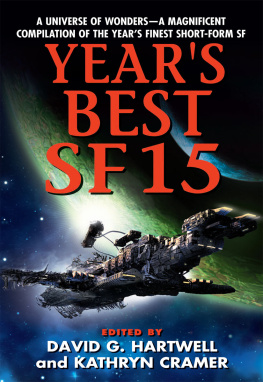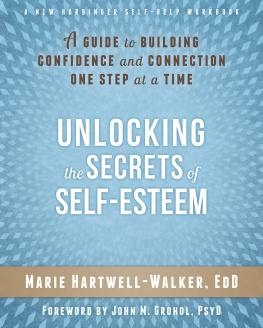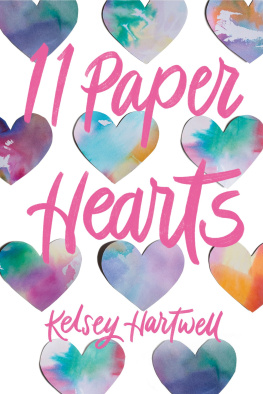David G. Hartwell - Years Best SF 15
Here you can read online David G. Hartwell - Years Best SF 15 full text of the book (entire story) in english for free. Download pdf and epub, get meaning, cover and reviews about this ebook. year: 2010, publisher: HarperCollins, genre: Detective and thriller. Description of the work, (preface) as well as reviews are available. Best literature library LitArk.com created for fans of good reading and offers a wide selection of genres:
Romance novel
Science fiction
Adventure
Detective
Science
History
Home and family
Prose
Art
Politics
Computer
Non-fiction
Religion
Business
Children
Humor
Choose a favorite category and find really read worthwhile books. Enjoy immersion in the world of imagination, feel the emotions of the characters or learn something new for yourself, make an fascinating discovery.
- Book:Years Best SF 15
- Author:
- Publisher:HarperCollins
- Genre:
- Year:2010
- Rating:4 / 5
- Favourites:Add to favourites
- Your mark:
- 80
- 1
- 2
- 3
- 4
- 5
Years Best SF 15: summary, description and annotation
We offer to read an annotation, description, summary or preface (depends on what the author of the book "Years Best SF 15" wrote himself). If you haven't found the necessary information about the book — write in the comments, we will try to find it.
Years Best SF 15 — read online for free the complete book (whole text) full work
Below is the text of the book, divided by pages. System saving the place of the last page read, allows you to conveniently read the book "Years Best SF 15" online for free, without having to search again every time where you left off. Put a bookmark, and you can go to the page where you finished reading at any time.
Font size:
Interval:
Bookmark:
To Canadian Fandom, especially to those we know and those we do not, who made our time in Montreal at the World SF convention a special treat. Thanks Eugene, thanks Rene, thanks Elisabeth, and special thanks to the people who created the necktie exhibit. And to the city of Montreal, for being itself.
And to Charles N. Brown, a Giant of SF, who would have enjoyed this dedication, and who had to miss Montreal. Death will do that to you.
And to Tor.com , for making our year harder, but better.
The year 2009 began with some layoffs and firings in publishing, but not many affecting SF. Still, some SF people lost their jobs. The really good news is that SF and fantasy sales held up throughout the year for most publishing lines in spite of comparative disasters in other areas of publishing. But it was for the most part not a year of expansion and commercial ambition.
The year 2010 is announced as one of economic recovery, and we certainly hope that is the case. In publishing, that means mostly holding the line, not growth. Several online venues for fantasy and SF, including the ambitious Baens Universe, have announced closings in early 2010. At least one of them, Internet Review of SF, has said they can no longer afford to lose money and that they see no way to break even, never mind profit.
Marketing genres associated with fantasy, paranormal romance, vampire and zombie books for teenagers, and urban fantasy were notably successful in 2009. One might even claim that F&SF expanded in 2009, but that would require ignoring that fact that the associated genres are not notable for much variation from the commercial formulas of the horror or romance genres; they are about feelings more than thought or knowledge.
The general quality of SF short fiction was no less in 2009, but from our vantage point there was a lot of SF with thinly-painted settings as backdrops for their characters, and in which not much happened. Sometimes, at least, this was done with style and sophistication, but not actually often enough for us to praise this trend.
The electronic book was hysterically discussed and promoted all year, but the sales of electronic text did not increase to as high as 4 percent of any major publishers income. Ian Randal Strock of SF Scope reported double-digit sales on his electronic bestseller. So print is still the principal venue for SF and fantasy in terms of economics for writers and for publishers. Bless my soul, someone even mentioned publically that Amazon.com might be inflating its sales claims for electronic books or Kindle readers. Its figures are of course secret.
And there was a scandal when it was discovered that one could lose an electronic book that one had bought if the seller decided it must take it backand how easily it could be done with, in this case, a book by George Orwell. Welcome to the cloud where you dont actually own, but just lease or license.
We are reminded of the feudal system, where we serfs dont actually own the property. The lords own it. It is the stuff of paranoid SF novels. They can come into your computer or reader or phone and delete. That information is no longer, as President Nixon once said of his previous statement of fact, operative. 1984 , anyone?
The magazines and original anthologies published a lot of good fiction but appeared to be commercially hard-pressed (with the occasional anthologies of vampire, zombie, and fantasy romance fiction the exception). Delivery and distribution bankruptcies hurt magazines and mass market books most of all. Trade paperbacks have been forced into prominence but costs, and therefore prices, are rising. This was also the year of the oversized ten-dollar ($9.99) mass market paperback. And of the highly discounted bestsellerat least four major retailers were selling select bestsellers at less than they paid for them. There was a good analysis of this in The New Yorker , showing who it would hurt (bookstores) and how.
And perhaps most important, this was the year that Google attempted to establish that it could violate copyright with impunity; 2010 will be the year that that happens, or doesnt. It is still in court.
Yet we still offer cautious optimism for the SF field. A lot of what has grown up on the internet in the last decade depends on the free time of employed people, or the free time generated by a person with a job in the household, and maybe even some of the household discretionary spending or borrowing. Some of that free time and money (and optimism) has evaporated, along with trillions of dollars from the national economies of the developed countries. So we look forward to creativity on a shoestring and less sleep.
There are still three professional magazines that publish SF, and several online venues that pay more than a token for fiction. However, much of the new fiction of high quality is showcased in original anthologies these days, and they are the source for just about half the wordage in this book (nine of the stories). Only mentioning the SF anthologies, among the best are: X6 , an Australian small press collection of novellas; Other Earths , edited by Nick Gevers; We Think Therefore We Are , edited by Pete Crowther; When It Changed , edited by Geoff Ryman; and the Solaris Book of New Science Fiction #3 , edited by George Mann.
Our Years Best SF is an anthology series about whats going on now in SF. We try in each volume of this series to represent the varieties of tones and voices and attitudes that keep the genre vigorous and responsive to the changing realities out of which it emerges, in science and daily life. It is supposed to be fun to read, a special kind of fun you cannot find elsewhere. The stories that follow show, and the story notes point out, the strengths of the evolving genre in the year 2009.
This book is full of science fictionevery story in the book is fairly clearly that and not something else. It is our opinion that it is a good thing to have genre boundaries. If we didnt, young writers would probably feel compelled to find something else, perhaps less interesting, to transgress or attack to draw attention to themselves. We have a high regard for horror, fantasy, speculative fiction, and slipstream, and postmodern literature. We (Kathryn Cramer and David G. Hartwell) edit the Years Best Fantasy as well, a companion volume to this onelook for it if you enjoy short fantasy fiction too. But here, we choose science fiction.
We make a lot of additional comments about the writers and the stories, and whats happening in SF, in the individual introductions accompanying the stories in this book. Welcome to the Years Best SF in 2009.
David G. Hartwell & Kathryn Cramer
Pleasantville, NY
Vandana Singh (users.rcn.com/singhvan/) is from India and lives in Framingham, Massachusetts, where she is an assistant professor of physics. Her stories are collected in The Woman Who Thought She Was a Planet (2008). Her novella Distances was published in 2008 by Aqueduct Press. She has also published two YA novels, Younguncle Comes to Town and Younguncle in the Himalayas. And she is the editor of To Each Her Own: Anthology of Contemporary Hindi Stories. In an interview she says, The city of Delhi is thousands of years old and I grew up surrounded by history, almost literally in the shadows of crumbling fort walls and nameless medieval monuments (among the modern high-rises). The very air wasand still isthick with stories. But I had to go away, to take the view from a far shore, to see all this.
Infinities was published in The Woman Who Thought She Was a Planet, which came out at the end of 2008 in India. She says, Physics is a way of viewing the world, and it is one of my most important lenses. One of the most exciting things about science is that it reveals the sub-text of the physical world. In other words, surface reality isnt all there is, the world is full of hidden stories, connections, patterns, and the scientific as well as the literary and psychological aspects of this multi-textured reality are, to me, fascinating. This is a story about a man in India who loves mathematics.
Font size:
Interval:
Bookmark:
Similar books «Years Best SF 15»
Look at similar books to Years Best SF 15. We have selected literature similar in name and meaning in the hope of providing readers with more options to find new, interesting, not yet read works.
Discussion, reviews of the book Years Best SF 15 and just readers' own opinions. Leave your comments, write what you think about the work, its meaning or the main characters. Specify what exactly you liked and what you didn't like, and why you think so.









